Socio-Rhetorical Commentary Series Collection | SRC (10 vols.)
Digital Logos Edition
Overview
Examine the New Testament in greater depth with the Socio-Rhetorical Commentary Series. This 10-volume collection offers the first sustained attempt to read and study the New Testament as both an ancient biography (as regards the Gospels) and as a form of ancient rhetoric. Using sociorhetorical criticism, the New Testament is interpreted within the context of the world in which it was written and read—the rhetorical method makes use of ancient or classical writings and strategies of communication, while the social science method notes issues of cultures and customs.
Verse-by-verse commentary on the Gospels, Acts, Romans, and several Pauline epistles will be valuable additions to your library, and with the Logos editions, these works are enhanced by amazing functionality. Scripture citations link directly to English translations, and important terms link to dictionaries, encyclopedias, and a wealth of other resources in your digital library. Perform powerful searches to find exactly what you’re looking for. Take the discussion with you using tablet and mobile apps. With Logos Bible Software, the most efficient and comprehensive research tools are in one place, so you get the most out of your study.

- Compiles 10 volumes and over 5,000 pages of verse-by-verse commentary
- Features a highly accessible yet academic writing style
- Provides extensive bibliographies and indexes in each volume
- Title: Socio-Rhetorical Commentary Series Collection
- Authors: Craig S. Keener; Ben Witherington III; Darlene Hyatt; David A. deSilva
- Publisher: Eerdmans
- Publication Date: 1995–2011
- Series: Socio-Rhetorical Commentary | SRC
- Volumes: 10
- Pages: 5,488
- Format: Digital > Logos Research Edition
- Resource ID: {98E4EF8A-FF8B-4676-83C4-623FF1884901}
This title is included in the following collections
You can save when you purchase this product as part of a collection.
Logos 7 Methodist & Wesleyan S...
$39.99$39.99Logos 7 Methodist & Wesleyan B...
$89.99$89.99Logos 6 Bronze Legacy Library
$89.99$89.99Logos 6 Methodist & Wesleyan B...
$89.99$89.99
- $349.99
- $349.99
- $349.99
- $549.99
- $849.99
- $849.99
- $849.99
- $1,499.99
- $1,499.99
- $2,999.99$2,249.99
- $2,999.99$2,249.99
- $3,149.99$2,362.49
- $2,999.99
- $4,749.99$3,562.49
- $4,749.99$3,562.49
- $4,749.99$3,562.49
- $4,899.99$3,674.99
- $4,749.99
- $4,749.99
- $4,749.99
- $8,445.13$6,499.99
- $11,399.99
- $23,999.99$17,999.99
- $21,749.99
- $24,999.99
- $37,403.33$27,999.99

This commentary on Matthew offers a unique interpretive approach that focuses on the socio-historical context of the Gospel and the nature of Matthew’s exhortation to his first-century Christian audience. By merging a careful study of Matthew’s Gospel in relation to the social context of the ancient Mediterranean world with a detailed look at what we know of first-century Jewish-Christian relations, Craig Keener uncovers significant insights into the Gospel not found in any other Matthew commentary. In addition, Keener’s commentary is a useful discipleship manual for the church. His approach recaptures the full “shock effect” of Jesus’ teachings in their original context and allows Matthew to make his point with greater narrative artistry. Keener also brings home the total impact of Matthew’s message, including its clear portrait of Jesus and its call for discipleship, both to the gospel’s ancient readers and to believers today. Thoroughly researched, the book includes a 150-page bibliography of secondary sources, and more than 150 pages of indexes.
Craig S. Keener, PhD, is widely known for his studies in the New Testament, and is a theologian, biblical scholar, and prolific author. Some of his other works include A Commentary on the Gospel of Matthew, The Gospel of John: A Commentary (2 Vols.), The Historical Jesus of the Gospels, and Gift & Giver: The Holy Spirit for Today. Keener is professor of New Testament at Palmer Theological Seminary and an associate minister at Enon Tabernacle Baptist Church.
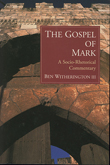
Ben Witherington III applies to Mark the sociorhetorical approach for which he is well known, opening a fresh new perspective on the earliest Gospel. Mark was written when the early Christians were experiencing a major crisis during the Jewish war. He provides us with the first window on how the life and teachings of Jesus were presented to a largely non-Jewish audience. According to Witherington, the structure of Mark demonstrates that this Gospel is biographically focused on the identity of Jesus and the importance of knowing who he is—the Christ, the Son of God. Because Christology—who Jesus is—stood at the heart of the earliest Christians’ faith, Mark reveals how important it was to these earliest Christians to persuade others about the nature of Jesus, both as a historical figure and as the Savior of the world.
Drawing on a host of ancient authors who were concerned with the form and function of rhetoric and writing, Ben Witherington interacts with a broad range of contemporary New Testament scholarship to offer his own informed interpretation of Mark’s Gospel. With clarity and conviction Witherington guides readers through complex, often controversial, issues of interpretation. This commentary offers both a new exposition of Mark’s Gospel and an intelligent introduction to scholarly Markan studies.
—Marion L. Soards, professor of New Testament studies, Louisville Presbyterian Theological Seminary
Witherington provides scholars and church leaders with an impressive, reliable, and often surprising commentary on the Gospel of Mark. He treats the book as an ancient biography of Jesus, written by and for people who were convinced that Jesus was the Son of God and Savior of the world. By being faithful to the literary dynamics of Mark’s text and attentive to the social dynamics of Mark’s world, Witherington reveals Mark’s life-transforming message of hope for our world today.
—Mark Allan Powell, Robert and Phyllis Leatherman Professor of New Testament, Trinity Lutheran Seminary
Ben Witherington III is professor of New Testament interpretation at Asbury Theological Seminary, Wilmore, Kentucky. He received his MDiv degree from Gordon-Conwell Theological Seminary and a PhD from the University of Durham in England. He is now considered one of the top evangelical scholars in the world, and is an elected member of the prestigious SNTS, a society dedicated to New Testament studies. A prolific writer, he has twice won the Christianity Today best Biblical Studies book-of-the-year award. Among his other books are The Christology of Jesus and Jesus, Paul, and the End of the World and The Jesus Quest. A popular lecturer, Witherington has presented seminars for churches, colleges and biblical meetings not only in the United States but also in England, Estonia, Russia, Europe, South Africa, Zimbabwe and Australia.
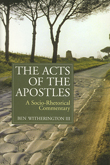
The commentary on Acts is written in a readable style, drawing on the best new insights from a number of disciplines (narrative, archaeology, social scientific study, rhetorical analysis, and comparative studies) to provide the reader with the benefits of recent innovative ways of analyzing the text. In addition, Witherington provides detailed attention to major theological and historical issues: the question of the relationship of Acts to the Pauline letters; the question of early Christian history and how the church grew and developed; the relationship or tension between first-century Judaism and early Christianity; and the relationship between Christianity and the officials of the Roman Empire.
This impressive commentary on the Acts of the Apostles exemplifies professor Witherington’s usual close and cautious reading of the biblical text with careful research in and response to relevant secondary literature. Overall, it is thorough, thoughtful, and balanced, though grounded without apology in his Christian faith perspective on the issues raised by the text.
—Biblica
Witherington has done students, pastors, and scholars a great favor by providing an analysis of the book of Acts that is fully conversant with the enormous secondary literature on Acts yet neither loses sight of Luke’s text nor bogs down in scholarly minutiae. His appraisal of Luke’s second volume in relationship to his Gospel and against the backdrop of classical rhetoric and ancient social sensibilities makes this book an instructive companion for readers of Acts.
—Joel B. Green, professor of New Testament interpretation, Fuller Theological Seminary
This is a very fine commentary that, unlike many others, takes seriously all dimensions of Luke’s text—historical, social, rhetorical, and theological. It is full of fresh insights and balanced assessments of controverted issues. It will be of great value as much to the expert scholar as to the reader approaching the study of Acts for the first time.
—Richard Bauckham, professor emeritus of New Testament studies, University of St. Andrews
Ben Witherington III is professor of New Testament interpretation at Asbury Theological Seminary, Wilmore, Kentucky. He received his MDiv degree from Gordon-Conwell Theological Seminary and a PhD from the University of Durham in England. He is now considered one of the top evangelical scholars in the world, and is an elected member of the prestigious SNTS, a society dedicated to New Testament studies. A prolific writer, he has twice won the Christianity Today best Biblical Studies book-of-the-year award. Among his other books are The Christology of Jesus and Jesus, Paul, and the End of the World and The Jesus Quest. A popular lecturer, Witherington has presented seminars for churches, colleges and biblical meetings not only in the United States but also in England, Estonia, Russia, Europe, South Africa, Zimbabwe and Australia.
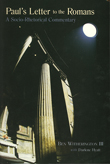
Most modern exegesis on Paul’s letter to the Romans has been overwhelmingly shaped by the Reformed tradition, having been filtered through Luther, Calvin, and others. Through a careful survey of work on Romans by both ancient Church Fathers and modern exegetical scholars, Witherington gleans fresh insights from reading the text of Paul’s epistle in light of early Jewish theology, the historical situation of Rome in the middle of the first century AD, and Paul’s own rhetorical concerns. Giving serious consideration to the social and rhetorical background of Romans allows readers to hear Paul on his own terms, not just through the various voices of his later interpreters. Witherington’s commentary on Romans also features a new, clear translation of the Greek text, and each section of the commentary ends with a brief discussion titled “Bridging the Horizons,” which suggests how the ancient text of Romans may speak to us today. Darlene Hyatt, a graduate student at Asbury Theological Seminary, assisted Witherington by providing some of the application materials for this commentary.
Ben Witherington is one of the most outstanding New Testament scholars of our generation, and in this commentary on Romans he brings his usual breadth of knowledge and reverence to the text. Scholars will appreciate the fresh analysis and rhetorical insights, while the work’s clear language and sensitivity to Paul’s message make it ideal for general readers desiring a readable commentary.
—Craig S. Keener, professor of New Testament, Asbury Theological Seminary
Ben Witherington’s sensible, clearly written commentary is based on a sound knowledge of the first-century Jewish and Greco-Roman discourses of which Paul’s letter to the Romans was a part, yet it also makes a point of addressing issues and concerns pertinent to twenty-first-century Christian life and faith. This volume should prove a valuable resource for students and preachers alike.
—Christopher Bryan, C. K. Benedict Professor of New Testament, emeritus, The University of the South
Ben Witherington III is professor of New Testament interpretation at Asbury Theological Seminary, Wilmore, Kentucky. He received his MDiv degree from Gordon-Conwell Theological Seminary and a PhD from the University of Durham in England. He is now considered one of the top evangelical scholars in the world, and is an elected member of the prestigious SNTS, a society dedicated to New Testament studies. A prolific writer, he has twice won the Christianity Today best Biblical Studies book-of-the-year award. Among his other books are The Christology of Jesus and Jesus, Paul, and the End of the World and The Jesus Quest. A popular lecturer, Witherington has presented seminars for churches, colleges and biblical meetings not only in the United States but also in England, Estonia, Russia, Europe, South Africa, Zimbabwe and Australia.
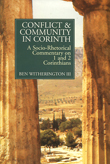
Here Witherington brings traditional exegetical and historical methods to the study of 1 and 2 Corinthians, analyzing Paul’s two letters in terms of Greco-Roman rhetoric and ancient social conditions and customs. This approach reveals the context and content of Paul’s message in a new light and discloses Paul’s relationship with his Corinthian converts.
Ben Witherington blends the best of recent sociological and rhetorical scholarship on Paul into a distinctive, rich, and accessible commentary on the Corinthian correspondence. His work operates at two levels: the main commentary offers an informative and edifying resource for students and preachers, while the more detailed investigations, bibliographies, and footnotes provide plenty to stimulate scholars. This is a bold, comprehensive, and impressive attempt to set Paul’s dialogue with the Corinthian church squarely in its social context and to illuminate the apostle’s art of persuasion.
—Andrew T. Lincoln, professor of New Testament studies, University of Gloucestershire
Ben Witherington has produced an innovative commentary on 1 and 2 Corinthians, making use of both ancient and modern tools to highlight aspects of the Corinthian situation and of the argument of Paul’s letters that have not been unearthed by previous commentators.
—Bruce W. Winter, emeritus professor of New Testament context, Queensland Theological College
State-of-the-art interpretation of the Corinthian letters . . . Ben Witherington offers us a lively conversation between a host of disciplines. The voices of archaeology, classics, rhetoric, sociology, anthropology, and philosophy are brought together in fruitful dialogue on the Corinthian letters. We are transported to the first century, hearing the letters for the first time with the mind and ears of the Corinthian congregations as they received them from Paul.
—Duane F. Watson, professor of New Testament studies, Malone College
Ben Witherington III is professor of New Testament interpretation at Asbury Theological Seminary, Wilmore, Kentucky. He received his MDiv degree from Gordon-Conwell Theological Seminary and a PhD from the University of Durham in England. He is now considered one of the top evangelical scholars in the world, and is an elected member of the prestigious SNTS, a society dedicated to New Testament studies. A prolific writer, he has twice won the Christianity Today best Biblical Studies book-of-the-year award. Among his other books are The Christology of Jesus and Jesus, Paul, and the End of the World and The Jesus Quest. A popular lecturer, Witherington has presented seminars for churches, colleges and biblical meetings not only in the United States but also in England, Estonia, Russia, Europe, South Africa, Zimbabwe and Australia.
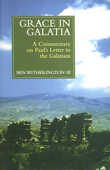
In Grace in Galatia, Witherington analyzes the whole of Galatians as a deliberative discourse meant to forestall the Galatians from submitting to circumcision and the Jewish law. The commentary features the latest discussion of major problems in Pauline studies, including Paul’s view of the law and the relationship between the historical data in Galatians and in Acts. The narrative character of Witherington’s work allows it to remain exceedingly accessible. The commentary again includes “Bridging the Horizons” sections which point to the relevance of the text for believers today. Grace in Galatia will be of special value to pastors and general readers as well as students and scholars.
Witherington’s lucid and thoughtful commentary is driven by the text rather than by some overarching theory about Paul or his opponents. The result is that Paul’s own concern in the letter emerges clearly—to proclaim the end of the Mosaic law and the powerful presence of the new era.
—Frank Thielman, Presbyterian professor of divinity, New Testament, Beeson Divinity School, Samford University
A new style of commentary on Galatians that is both soundly based yet involved with the latest currents in biblical scholarship. This book is a testament to what can be achieved by a critic who is willing to balance scholarly discipline with cultural and exegetical imagination.
—Philip Esler, Portland Chair in New Testament Studies, University of Gloucestershire
A work characterized by clarity of vision regarding the critical, historical, and theological issues involved . . . and by a crispness and vividness of language in setting out the message of Galatians in contemporary form. This commentary will undoubtedly have a long and useful life, capturing the interest and hearts of many.
—Richard Longenecker, distinguished professor of New Testament, McMaster Divinity College
Ben Witherington III is professor of New Testament interpretation at Asbury Theological Seminary, Wilmore, Kentucky. He received his MDiv degree from Gordon-Conwell Theological Seminary and a PhD from the University of Durham in England. He is now considered one of the top evangelical scholars in the world, and is an elected member of the prestigious SNTS, a society dedicated to New Testament studies. A prolific writer, he has twice won the Christianity Today best Biblical Studies book-of-the-year award. Among his other books are The Christology of Jesus and Jesus, Paul, and the End of the World and The Jesus Quest. A popular lecturer, Witherington has presented seminars for churches, colleges and biblical meetings not only in the United States but also in England, Estonia, Russia, Europe, South Africa, Zimbabwe and Australia.
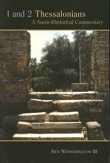
Paul’s two letters to the Thessalonians stand as some of the very earliest Christian documents, yet they appear well into Paul’s missionary career, giving them a unique context well worth exploring. Witherington provides a reading of Paul’s text in the light of rhetorical concerns and patterns, early Jewish theology, and the first-century historical situation in Macedonia. He details Thessalonica’s place as the “metropolis” of Macedonia and carefully unpacks the social situation of Paul and his recipients. Scholars will appreciate the careful analysis and rhetorical insights contained here, while Witherington’s clear prose and sensitivity to Paul’s ideas make this work ideal for all who desire a useful, readable commentary on 1 and 2 Thessalonians.
Students of the New Testament have come to expect from Ben Witherington not only unfathomable productivity but also serious scholarly work that is unfailingly informed and insightful. Witherington’s socio-rhetorical treatment of 1 and 2 Thessalonians reinforces and even heightens these expectations. Witherington sheds much light on these early Pauline letters by paying particular attention to their rhetorical features and socio-historical milieu. All the while, he is aware of and alive to the theological and pastoral dimensions of 1 and 2 Thessalonians. As I seek to understand these fascinating documents more fully, I will keep this significant commentary close to hand. Those who are seeking a clear, thorough, and creative reading of Paul’s Thessalonian correspondence would do well to do the same.
—Todd D. Still, William M. Hinson Professor of Christian Scriptures, Truett Theological Seminary, Baylor University
Ben Witherington is a master at crafting commonsense commentaries that are accessible to a broad spectrum of readers and conversant with the best of scholarship. In this regard his 1 and 2 Thessalonians does not disappoint. It is one of his best.
—Bruce W. Longenecker, professor of religion, Baylor University
Ben Witherington III is professor of New Testament interpretation at Asbury Theological Seminary, Wilmore, Kentucky. He received his MDiv degree from Gordon-Conwell Theological Seminary and a PhD from the University of Durham in England. He is now considered one of the top evangelical scholars in the world, and is an elected member of the prestigious SNTS, a society dedicated to New Testament studies. A prolific writer, he has twice won the Christianity Today best Biblical Studies book-of-the-year award. Among his other books are The Christology of Jesus and Jesus, Paul, and the End of the World and The Jesus Quest. A popular lecturer, Witherington has presented seminars for churches, colleges and biblical meetings not only in the United States but also in England, Estonia, Russia, Europe, South Africa, Zimbabwe and Australia.
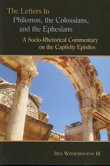
This volume completes Ben Witherington’s contributions to the set of Eerdmans sociorhetorical commentaries on the New Testament. In addition to the usual features of these commentaries, Witherington offers an innovative way of looking at Colossians, Ephesians, and Philemon as interrelated documents written at different levels of moral discourse. In Philemon we see Paul using moral discourse in an intimate, personal setting. Colossians presents a vice/virtue list, along with a household code, while Ephesians focuses on community values. Witherington successfully analyzes these documents as examples of Asiatic rhetoric, explaining the differences in style from earlier Pauline documents. He further shows that Paul is deliberately engaging in the transformation of existing social institutions.
Every time Ben Witherington writes a commentary, I buy it. Why? Because few can explain the rhetoric of a New Testament book as clearly as Ben, few can match the theological awareness of Ben, few canvass scholarship as completely as Ben, and fewer yet can combine rhetoric, theology, scholarship, and piety as well as Ben.
—Scot McKnight, professor of New Testament, Northern Seminary
A solid commentary, a sane introduction, and a superior integration of these letters historically and culturally. The Letters to Philemon, the Colossians, and the Ephesians is Witherington at his best. Anyone with questions about how these letters function and who wrote them would do well to start and finish here.
—Darrell Bock, professor of New Testament studies, Dallas Theological Seminary
Ben Witherington’s rhetorical approach to the letters to Philemon, the Colossians, and the Ephesians sheds important new light on questions that have puzzled and divided interpreters for generations. Fresh and insightful throughout, this reader-friendly commentary strongly supports Pauline authorship by clarifying the distinctive features of these interesting letters and the various circumstances of their respective recipients. Highly recommended!
—Craig A. Evans, Payzant distinguished professor of New Testament studies, Acadia Divinity College
With a deeply pastoral heart and an equally deep mastery of historical-critical research into the first-century world, Ben Witherington offers a new commentary on Philemon, Colossians, and Ephesians. Readers will discover here the riches that historical scholarship offers to insight into the realities of faith. Whether tackling difficult topics such as Paul on slavery, or defending Pauline authorship of Ephesians, or applying Paul’s words to contemporary problems faced by Christians, Witherington consistently shows his love for Jesus Christ, whom he seeks to encounter in truth.
—Matthew Levering, James N. and Mary D. Perry, Jr. Chair of Theology, University of Saint Mary of the Lake
Ben Witherington III is professor of New Testament interpretation at Asbury Theological Seminary, Wilmore, Kentucky. He received his MDiv degree from Gordon-Conwell Theological Seminary and a PhD from the University of Durham in England. He is now considered one of the top evangelical scholars in the world, and is an elected member of the prestigious SNTS, a society dedicated to New Testament studies. A prolific writer, he has twice won the Christianity Today best Biblical Studies book-of-the-year award. Among his other books are The Christology of Jesus and Jesus, Paul, and the End of the World and The Jesus Quest. A popular lecturer, Witherington has presented seminars for churches, colleges and biblical meetings not only in the United States but also in England, Estonia, Russia, Europe, South Africa, Zimbabwe and Australia.
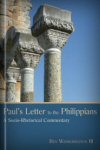
Paul’s short, affectionate letter to the Philippians has been much belabored of late by biblical scholars keen to analyze it in light of Greco-Roman letter-writing conventions. Yet Ben Witherington argues that Philippians shouldn’t be read as a letter at all but, rather, as a masterful piece of long-distance oratory—an extension of Paul’s oral speech, dictated to a scribe and meant to be read aloud to its recipients.
With this in mind, Witherington analyzes Philippians in light of Greco-Roman rhetorical conventions, identifying Paul’s purpose, highlighting his main points and his persuasive strategies, and considering how his audience—denizens of a society of limited literacy yet saturated in highly skilled oral rhetoric—would have heard and received Paul’s message.
Ben Witherington III is professor of New Testament interpretation at Asbury Theological Seminary, Wilmore, Kentucky. He received his MDiv degree from Gordon-Conwell Theological Seminary and a PhD from the University of Durham in England. He is now considered one of the top evangelical scholars in the world, and is an elected member of the prestigious SNTS, a society dedicated to New Testament studies. A prolific writer, he has twice won the Christianity Today best Biblical Studies book-of-the-year award. Among his other books are The Christology of Jesus and Jesus, Paul, and the End of the World and The Jesus Quest. A popular lecturer, Witherington has presented seminars for churches, colleges and biblical meetings not only in the United States but also in England, Estonia, Russia, Europe, South Africa, Zimbabwe and Australia.
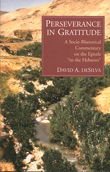
This commentary is the first to fully apply the resources of sociorhetorical analysis to Hebrews. Insights into the cultural and social world of the audience are combined with analysis of the author’s rhetorical strategy and ideology to create a rich, three-dimensional reading that helps unravel key issues in the interpretation of the epistle. David deSilva’s reflections on application concluding each section also make his commentary valuable to seminarians and pastors seeking to make Hebrews relevant to today’s world.
This is an innovative and important full-scale commentary on one of the lengthiest and least-appreciated books in the New Testament. It is written in an engaging, generally non-technical style that should make it attractive to interested laypeople as well as students, pastors, and scholars. . . . DeSilva has written an enthusiastic commentary that offers valuable insights and many particular suggestions about how the letter’s teachings apply today.
—Interpretation
Using an integrated, coherent program of multiple strategies of analysis and interpretation, this commentary by David deSilva gives rich, deep insights into the argumentative, social, cultural, ideological, and sacred texture of Hebrews. Traditional knowledge about the epistle gains fresh perspective, and new insights emerge to lead us into a new era of interpretation of early Christian discourse. A wonderful achievement and a lasting contribution.
—Vernon K. Robbins, professor of New Testament and comparative sacred texts, Emory University
This commentary bears much fruit from the recent emphasis on interdisciplinary studies and socio-rhetorical analysis in New Testament exegesis. David deSilva shows how the interpreter of Hebrews benefits from the dialogue between rhetorical criticism, social-scientific analysis, cultural anthropology, and ideological criticism. He clarifies not only the words on the page but also how those words relate to the world from which they were borrowed and upon which they were intended to have an impact. To top it off, deSilva conducts this dialogue with engaging prose that brings his interpretation to bear on the Christian life in the modern world.
—Duane F. Watson, professor of New Testament studies, Malone College
Perseverance in Gratitude is a masterpiece that provides plenty of value for all types of readers. Specialists will appreciate the application of socio-rhetorical criticism to Hebrews. Non-specialists will appreciate the clear explanation of socio-rhetorical criticism and of ancient rhetoric. Preachers will appreciate the ‘Bridging the Horizons’ sections. And all readers will appreciate the clarity of deSilva’s writing. . . . I warmly welcome this commentary as a fine textbook for teaching Hebrews in the classroom.
—Peter H. Davids, independent scholar and educational missionary in Europe
In this welcome commentary deSilva accomplishes what commentators rarely achieve—a perfect blend of academic rigor, theological probity, and practical astuteness.
—Bruce W. Longenecker, professor of religion, Baylor University
David A. deSilva (PhD, Emory University) is distinguished professor of New Testament and Greek at Ashland Theological Seminary in Ohio. He is the author of An Introduction to the New Testament; Introducing The Apocrypha: Message, Context, And Significance; Honor, Patronage, Kinship and Purity and a contributor to the Lexham Greek-English Interlinear Septuagint.
Reviews
7 ratings
Bob
1/9/2023
Mark Johns
7/3/2021
Just bought the Socio-Rhetorical New Testament commentaries. It was part of one of the Logos 7 Legacy Libraries. I am impressed.. Bought the Library just to get these commentaries. Believe me, it was well worth the purchase. This is far superior to most of the denominational commentaries out there. A Nice scholarly work that is "well done."Mark Johns
7/3/2021
Just bought the Socio-Rhetorical New Testament commentaries. It was part of one of the Logos 7 Legacy Libraries. I am impressed.. Bought the Library just to get these commentaries. Believe me, it was well worth the purchase. This is far superior to most of the denominational commentaries out there. A Nice scholarly work that is "well done."
GaoLu
2/5/2018
Benjamin Carbone
5/30/2017
Ben Rodgers
5/19/2015
Donovan Neufeldt
3/26/2015
This set of commentaries is a valuable treasure for the student, and well worth it. They provide a depth of exegesis and understanding of the context and occasion for the books they comment on. The style is different that a verse by verse commentary, but it is often to look at things in context an in literary units. If you can get this in a base package (even bronze) your laughing. Don't miss out while they are included in logos 6. By the way, I have read most of the Romans commentary, and it is definitely one of the best, and not enslaved to reformation/ Augustinian dogma. Context is key!!!Eduardo Vega
11/8/2014

O T Morgan
4/28/2014